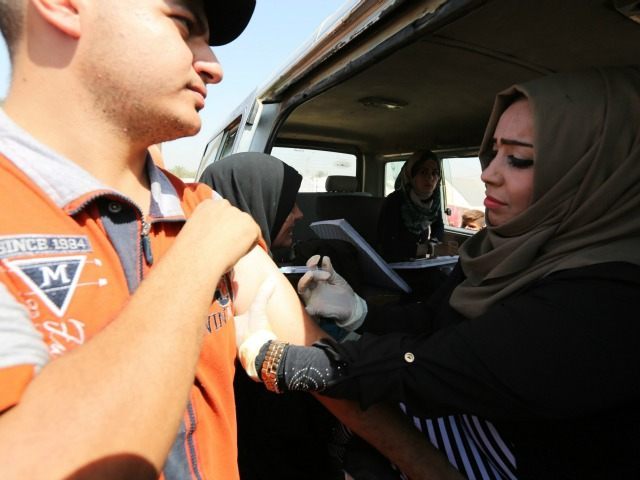A cholera outbreak that had affected a reported 100 Iraqis in late September has now spread to over 1,400 patients, Iraq’s health ministry warned this week. The disease, carried through unclean water, has spread throughout the country, though the Iraqi government can only monitor cases in regions not controlled by the Islamic State.
Kurdish news outlet Rudaw reports that only one of the reported cases has resulted in death, but that cholera infections are significantly challenging Iraq’s eroding health infrastructure. “Up until the night of Monday, October 12, the number of infections of cholera in Iraq reached 1,430, out of which one person died,” health ministry spokesman Ahmed Rideni told reporters. The cases spread from the outskirts of Baghdad to Kurdish controlled cities like Erbil and Duhok. “The majority of cases are from the refugee camps,” the spokesman added.
The Kurdistan region in particular has been forced to open and maintain refugee camps for Christians, Yazidis, and Shiite Muslims fleeing the Islamic State. Erbil, in particular, has become home to more than 100,000 refugees in the past year.
Iranian state media claims the number of cholera cases is even higher– upwards of 1,500– citing the Arabic-language al-Baghdadia TV channel.
These numbers are significantly higher than they were last week, when the health ministry claimed to have documented 1,200 cases, and higher than they were at the end of September, when humanitarian organizations had recorded up to 300 cases.
The World Health Organization reports it has “deployed a team of international experts under the Global Outbreak Alert and Response Network (GOARN) to support MoH respond to this outbreak.” It is also working to distribute cholera vaccines in accessible parts of Iraq.
The threats of a cholera outbreak surfaced as early as August 2014, shortly after the Islamic State conquered the city of Mosul, the second largest city in Iraq and their de facto caliphate capital in that country. The Hammurabi Human Rights Organization, an NGO, then warned that clean water was becoming increasingly scarce, and the use of contaminated water could make a disease easily spreadable in impoverished areas.
There are no records of how many people in ISIS-controlled areas are suffering from cholera. Reports of water-borne disease taking hold in Mosul surfaced online as early as December 2014, however, in contrast with the claims of advanced medical technology accessible to Mosul residents in ISIS propaganda videos. There has been little word out of Mosul since that report, however, other than occasional reports from those inside that residents “feel abandoned” and have little hope that the Islamic State will ever leave.
Reporting stories out of Mosul is a dangerous endeavor and thus rarely occurs. Among the few exceptions is the website “Mosul Eye,” whose anonymous proprietor attests to being a regular target of death threats. “The dangers are quite big and continuous. I have received many threats from ISIS; in the last one they said they would invent a way to kill me that has so far been unknown to humanity,” he said in a rare interview published this week.

COMMENTS
Please let us know if you're having issues with commenting.